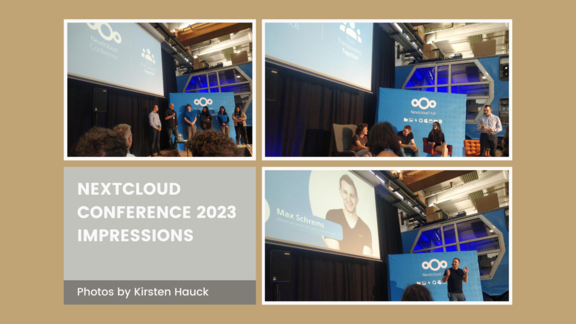Nextcloud Conference Report
This year's Nextcloud conference, which took place on September 16-17 2023 in Berlin, Germany, featured the Nextcloud Hub 6 announcement and some wonderful workshops that introduced us to tons of ways to learn more and get involved with Nextcloud. The report is by Kirsten Hauck, software developer at processCentric.
Hub 6 announcement
As the first big act of the conference, the Nextcloud team gave us a great overview of the latest release of the Nextcloud Hub.
Technically, it's released as version 27.1, no major version increments, which has caused some confusion. Note about the structure of Nextcloud: most features, and therefore most updates, are structured as separate apps, even the ones that are included by default and generally considered to be "part of basic Nextcloud", like the file preview app or the calendar. This means that even with all the new updates, the base Nextcloud code hasn't actually changed much, and, most importantly, none of the endpoints have changed. This means that other developers (like me!) whose apps work with the Nextcloud endpoints don't need to change anything.
The team decided to theme the new release around their Enterprise line, refining notifications, chats, and productivity integrations to help encourage "healthy meeting culture".
Probably the point in the talk that caused the most controversy: The announcement of their AI assistant. Considering how controversial large language models are among developers, especially those who worry about data ownership and privacy, this is understandable. "AI"s have a reputation for being built on stolen or scraped data without regard for ownership or privacy, and frequently threaten the edges of copyright. There are frequent stories of big companies giving their models access to user's personal data.
Anticipating this, the Nextcloud team had an extensive list of mitigations to explain how they'd worked to ensure the data was ethically used and produced. The AI assistant will never take the data back to the "mothership", so to speak - your data stays strictly on your cloud. Though it's important to note that A) Google says much the same thing, albeit in less trustworthy circumstances and B) This can still pose privacy issues within the cloud, for example in the case of medical files, where sensitive data needs to be strictly restricted even between users of the cloud. Still, it distinguishes itself by being opt-in, and Nextcloud's promises of data security carry more weight than Google's, as an open-source and self-hosted solution.
Workshops
The developer workshops were packed with people eager to learn how to work with Nextcloud and extend it.
The first was probably the busiest: an introductory workshop with several Nextcloud developers, meant to get people started in app development. It was a lively (if slightly chaotic) event. The developers were happy to wander the room answering questions, and there was a fair amount of collaboration, since the attendees had a wide range of experience levels and could share helpful tips for getting things up and running.
Another workshop was hosted by Michael Meeks, presenting on Collabora, the organization behind Nextcloud's Office suite and thus a close collaborator (ha) of theirs. He gave us an exciting glimpse into what that sort of close work can look like. I also attended a highly technical, specialized workshop discussing the encryption recovery process in cases of failure. Yahe, our presenter, has created an Encryption Recovery Tool, vital in allowing users to recover data from their encrypted databases in case of failure.
I look forward to seeing what the Nextcloud team comes up with next! I've learned a lot and I intend to apply some tips from the workshop to our BPMN Modeler app, BPM Files.

